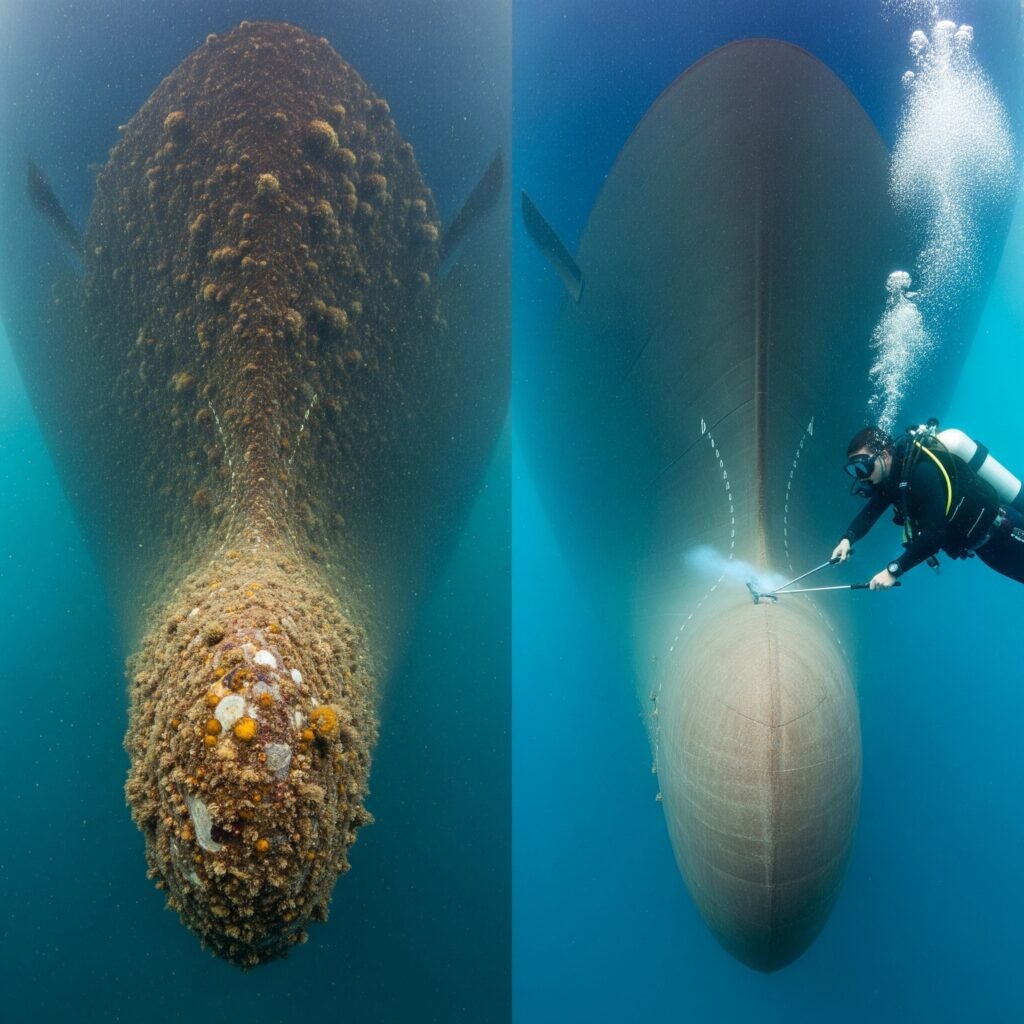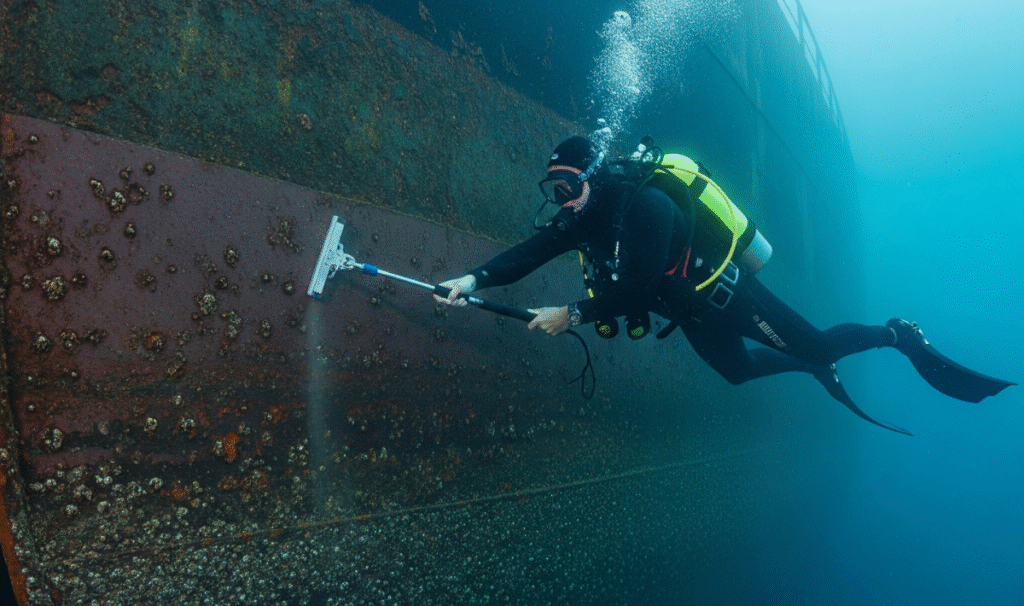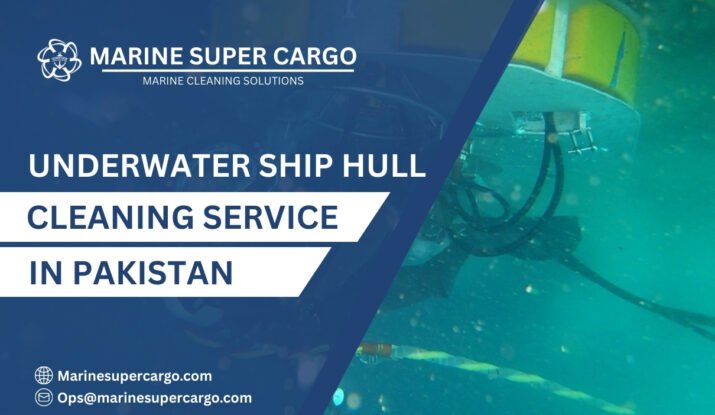Pakistan isn’t just a land of mountains and historic cities—it’s also a country with a deep connection to the sea. With ports like Karachi, Gwadar, and Port Qasim playing vital roles, Pakistan acts as a key maritime bridge linking South Asia, the Middle East, and Africa.
Every day, bulk carriers, oil tankers, and container ships arrive in Pakistani ports. And while cargo is loaded and unloaded, the ships themselves deal with a constant challenge: biofouling—marine growth that sticks stubbornly to hulls below the waterline.
The solution? Underwater ship hull cleaning in Pakistan. This essential service may seem invisible beneath the waves, but its impact on efficiency, safety, and the environment is massive.
What is Underwater Ship Hull Cleaning in Pakistan?
Think of a ship’s hull like a racing car’s body—streamlined for speed and efficiency. Now imagine driving that car covered in mud. That’s exactly what happens when algae, barnacles, and mussels accumulate underwater on vessel hulls.
Underwater ship hull cleaning in Pakistan involves sending divers or remotely operated systems below the surface to brush, scrub, or suction off these marine organisms. The result: a smooth hull restored to peak performance—ready for efficient, safe, and eco-friendly voyages.
How Biofouling Affects Fuel Use
Marine fouling increases drag, forcing engines to burn more fuel. According to global studies, ships with fouled hulls consume up to 30–40% more fuel. That’s not just bad for the planet—it’s bad for business, especially for ship operators navigating busy Pakistani ports.

Economic Gains from Regular Cleaning
By opting for underwater ship hull cleaning in Pakistan, vessels save thousands of liters of fuel. For large vessels calling at Karachi or Gwadar, this translates into millions saved annually. A clean hull also reduces voyage times and enhances competitiveness in international markets.
Corrosion Risks and Preventive Action
Biofouling doesn’t just slow ships—it triggers corrosion. When organisms cling to a hull, they retain seawater and break down coatings, allowing rust to eat away at steel.
Routine underwater ship hull cleaning in Pakistan prevents such damage. Removing fouling extends the lifespan of hull coatings, preserves steel structures, and reduces the chance of unexpected maintenance emergencies.
Global Safety Compliance for Shipowners
International standards, especially those governed by the IMO, demand hull maintenance for safety reasons. Ships docking in Pakistani ports must still comply with these standards. Neglect can mean penalties, delays, or inspection failures. Regular cleaning ensures compliance and safe sailing.
Reducing Greenhouse Gas Emissions
Shipping contributes about 3% of global CO₂ emissions, according to imo.org. Hull fouling exacerbates this problem by increasing fuel burn. By ensuring underwater ship hull cleaning in Pakistan, operators directly contribute to emission cuts—benefiting both their wallets and the planet.
Preventing Spread of Invasive Marine Species
The MARPOL Convention highlights biofouling as a vector for invasive species transfer. Imagine barnacles from another ocean clinging to a ship arriving in Karachi—they could devastate local ecosystems. Hull cleaning minimizes this risk, protecting Pakistan’s coastal biodiversity.
Pakistan’s Strategic Location on Trade Routes
Sitting on the crossroads of Asia and the Middle East, Pakistan is a natural stopover for ships traveling along major global trade routes. Scheduling underwater ship hull cleaning in Pakistan during port stops is efficient, cost-effective, and strategic.
Port Infrastructure and Skilled Workforce
With support from guidelines by imca-int.com and operational insights from iaphworldports.org, Pakistan’s growing maritime sector offers skilled divers and modern techniques—ensuring hulls are cleaned effectively and responsibly.
How the Hull Cleaning Process Works
Step-by-Step Cleaning Methodology
- Pre-Inspection: Divers or ROVs assess fouling extent.
- Biofouling Removal: Brushes, suction devices, or cavitation tools clean hull surfaces.
- Polishing: Hull smoothed to restore streamlining.
- Debris Capture: Removed material collected to prevent pollution.
- Final Assessment: Compliance and maintenance reports issued.
Tools and Technologies in Pakistan
Underwater ship hull cleaning in Pakistan increasingly uses eco-sensitive methods—robotic cleaners, debris filtration, and high-pressure brushing—to ensure efficiency with minimal ecological disruption.
High Fouling Rates in Warm Seas
The Arabian Sea’s warm, nutrient-rich water accelerates fouling. Ships idling in Karachi or Gwadar face a quicker build-up compared to colder seas. That’s why underwater ship hull cleaning in Pakistan is more critical than in many other regions.
Balancing Cleaning Costs and Frequency
Over-cleaning can strip protective coatings. Under-cleaning raises costs and emissions. Experts recommend cleaning every 6–12 months, depending on vessel routes and downtime in port.

Future of Hull Cleaning in Pakistan
Emerging Eco-Friendly Approaches
The future lies in green practices—biocide-free antifouling paints, waste-trapping technologies, and sustainable scrubbing techniques. Pakistan’s focus on eco-friendly practices will shape the future of hull maintenance.
The Role of Robotics and AI in Future Maintenance
Imagine AI sensors predicting hull fouling and ROVs cleaning automatically without divers. This isn’t sci-fi; it’s the future of underwater ship hull cleaning in Pakistan, and it will change maintenance forever.
Conclusion
The sea doesn’t forgive neglect. Ships that carry fouling also carry hidden risks—higher costs, safety concerns, and environmental harm. Regular maintenance below the waterline transforms these challenges into opportunities.
The 3 key benefits of underwater ship hull cleaning in Pakistan are:
- Fuel efficiency and operational savings.
- Enhanced safety and prolonged vessel lifespan.
- Environmental protection through reduced emissions and the prevention of invasive species.
For shipowners, operators, and stakeholders, hull cleaning in Pakistan is more than routine maintenance—it’s a smart, strategic investment. Partnering with CleanShip.co ensures safer, greener, and more profitable voyages.
FAQ:
Q1. How often should hull cleaning be done in Pakistan?
Typically every 6–12 months, but warm seas may require shorter intervals.
Q2. Does hull cleaning remove protective coatings?
Not if done professionally. Modern tools preserve coatings while removing growth.
Q3. How does underwater hull cleaning save money?
By cutting drag, ships burn less fuel, saving thousands in operational costs.
Q4. Why is Pakistan a good place for hull cleaning?
Because of its strategic trade location, growing port facilities, and skilled maritime workforce.
Q5. Can hull cleaning protect marine biodiversity?
Yes. Underwater ship hull cleaning in Pakistan reduces invasive species risks, helping preserve fragile coastal ecosystems.


